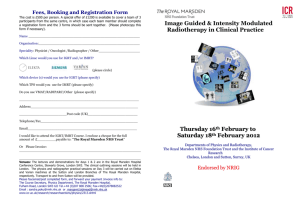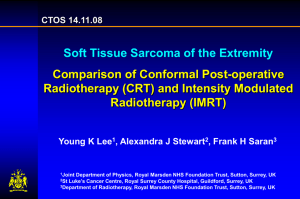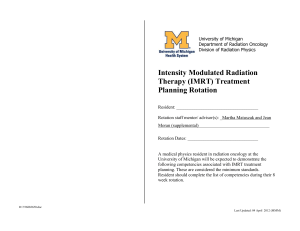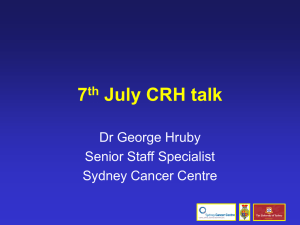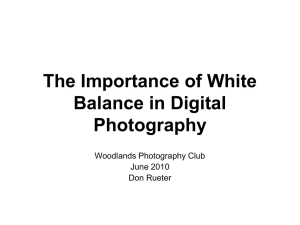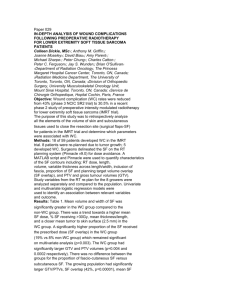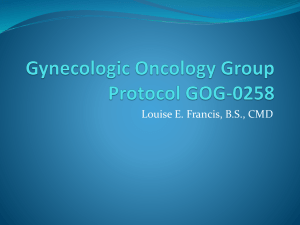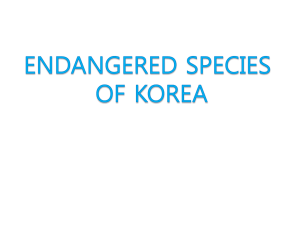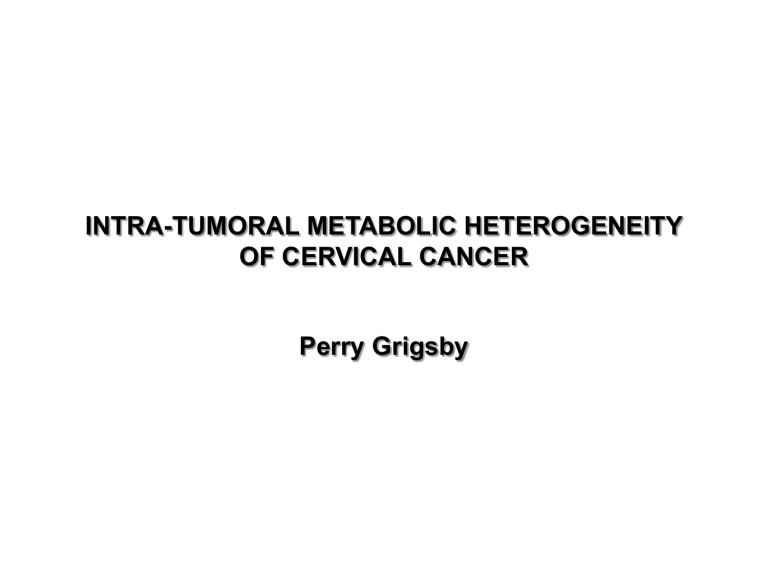
INTRA-TUMORAL METABOLIC HETEROGENEITY
OF CERVICAL CANCER
Perry Grigsby
Tumor Heterogeneity
Definition
Pre-Treatment
600
500
Y Variables
400
300
200
100
0
-100
0
10
20
30
40 50 60 70
Percent Threshold
80
90 100 110
Heterogeniety = d(V)/d(T)
Chemo-IMRT Timeline
7-8 weeks (~55 days)
4 days
IMRT
4 days
IMRT
4 days
IMRT
4 days
IMRT
4 days
IMRT
4 days
IMRT
IMRT
1 day
HDR
Pre-tx
FDG-PET
& MR
Plan
IMRT
1 day
HDR
1 day
HDR
1 day
HDR
1 day
HDR
1 day
HDR
ADC-MR to guide brachytherapy
Post-tx
FDG-PET
& MR
Evaluate
response
Change in Heterogeneity During Treatment
Cell Point Chart
Error Bars: ± 1 Standard Error(s)
-.2
Heterogeneity (dV/dT)
-.3
-.4
-.5
-.6
-.7
-.8
-.9
-1
Pre-Treatment
Week 2
Week 4
Cu-ATSM
Hypoxia
Axial
A
B
C
Coronal
Sagittal
Fraction of 64Cu-ATSM Threshold Volume Within the
FDG Defined Tumor Volume
Threshold
Mean ± SEM
40%
0.773 ± 0.013
50%
0.536 ± 0.023
60%
0.357 ± 0.024
70%
0.202 ± 0.018
80%
0.087 ± 0.010
Progression Free Survival
64Cu-ATSM
Heterogeneity
1
0.8
p=0.04
0.6
Hetero > -1.7
Hetero ≤ -1.7
0.4
0.2
0
0
5
10
15
20
25
30
Time (Months)
35
40
45
Non-Spatial
Other Measures of
Heterogeneity
Texture & Shape of Metabolism
A toy example for demonstration of constructing the co-occurrence matrix. (a) Test
image of size 4x4 and 4 intensity levels (M=4). The corresponding co-occurrence matrix
assuming single pixel distance in: (b) East direction and (c) all directions. The matrix is
converted into a probability mass function by normalization so that the sum is equal to unity.
Co-occurrence matrix for 40% SUV
0.1
0.05
0
8
6
4
2
5
6
7
8
Co-occurrence matrix for 40% SUV
0.05
0.04
0.03
0.02
0.01
0
8
6
8
6
4
4
2
2
0
0
Texture Features
•
•
•
•
Energy
Contrast
Local Homogeneity
Entropy
Shape-based Features
•
•
•
•
Eccentricity
Euler Number
Solidity
Extent
Volumetric run length type texture
Feature
Definition
Short Run Emphasis
SRE
Long Run Emphasis
Low Gray-Level Run Emphasis
LRE
Description
M
1
nr
i 1
P (i , j )
j2
j 1
Measures the distribution of short runs. The SRE is highly dependent on
the occurrence of short runs and is expected large for fine textures.
M
N
Measures distribution of long runs. The LRE is highly dependent
on the occurrence of long runs and is expected large for coarse
structural textures.
1
nr
P(i, j ) j 2
i 1 j 1
1
nr
LGRE
N
M
N
P (i , j )
i2
j 1
i 1
N
1
P (i , j ) i 2
nr i 1 j 1
Measures the distribution of low gray level values. The LGRE is
expected large for the image with low gray level values.
M
High Gray-Level Run Emphasis
HGRE
Short Run Low Gray-Level Emphasis
SRLGE
M
N
Measures the distribution of high gray level values. The HGRE is
expected large for the image with high gray level values.
i
P (i , j )
2
j2
j 1
Measures the joint distribution of short runs and low gray level
values. The SRLGE is expected large for the image with many
short runs and lower gray level values.
Short Run High Gray-Level Emphasis
1
SRHGE
nr
P (i , j ) i 2
j2
i 1 j 1
Measures the joint distribution of short runs and high gray level
values. The SRHGE is expected large for the image with many
short runs and high gray level values.
Long Run Low Gray-Level Emphasis
1
LRLGE
nr
P (i , j ) j 2
i2
i 1 j 1
Measures the joint distribution of long runs and low gray level
values. The LRLGE is expected large for the image with many
long runs and low gray level values.
Long Run High Gray-Level Emphasis
LRHGE
Gray-Level Non-uniformity
1 MN
GLNU P(i , j )
nr i 1 j 1
Run Length Non-uniformity
RLNU
Run Percentage
RP
1
nr
1
nr
i 1
M
M
N
N
1 M N
P (i , j ) i 2 j 2
nr i 1 j 1
2
M
P (i , j )
j 1 i 1
nr
M N
N
Measures the joint distribution of long runs and high gray level
values . The LRHGE is expected large for images with many long
runs and high gray level values.
Measures the similarity of gray level values through out the image.
The GLNU is expected small if the gray level values are alike
through out the image.
2
Measures the similarity of the length of runs through out the
image. The RLNU is expected small if the run lengths are alike
through out the image.
Measures the homogeneity and the distribution of runs of an
image in a specific direction. The RP is the largest when the
length of runs is 1 for all gray levels in specific direction.
30
Volumetric run length type texture
31
Volumetric zone length type texture
Feature
Short Zones Emphasis (SZE)
Long Zones Emphasis (LZE)
Low Grey-Level Zone Emphasis (LGZE)
Definition
SZE
LZE
M
1
nr
1
nr
LGZE
N
i 1
Q(i , j )
j2
j 1
M
N
Q(i, j ) j
2
i 1 j 1
1
nr
M
N
Q(i , j )
i2
j 1
i 1
M
N
1
Q(i , j ) i 2
nr i 1 j 1
High Grey-Level Zone Emphasis (HGZE)
HGZE
Short Zone Low Gray-Level Emphasis (SZLGE)
SZLGE
1
nr
M
N
Q(i , j )
2
j2
j 1
i
i 1
Short Zone High Gray-Level Emphasis (SZHGE)
1
SZHGE
nr
Q(i , j ) i 2
j2
i 1 j 1
Long Zone Low Gray-Level Emphasis (LZLGE)
1
LZLGE
nr
Q(i , j ) j 2
i2
i 1 j 1
Long Zone High Gray-Level Emphasis (LZHGE)
LZHGE
Gray Level Non-Uniformity (GLNU)
1 MN
GLNU Q(i , j )
nr i 1 j 1
Zone Length Non-Uniformity (ZLNU)
ZLNU
Zone Percentage (ZP)
ZP
1
nr
M
M
N
N
1 M N
Q(i, j ) i 2 j 2
nr i 1 j 1
2
M
Q(i , j )
j 1 i 1
N
2
nr
M N
32
Volumetric zone length type texture
33
Chemo-IMRT Timeline
7-8 weeks (~55 days)
4 days
IMRT
4 days
IMRT
4 days
IMRT
4 days
IMRT
4 days
IMRT
4 days
IMRT
IMRT
1 day
HDR
Pre-tx
FDG-PET
& MR
Plan
IMRT
1 day
HDR
1 day
HDR
1 day
HDR
1 day
HDR
1 day
HDR
ADC-MR to guide brachytherapy
Post-tx
FDG-PET
& MR
Evaluate
response
Diffusion Weighted Imaging
T2W
ADC
Patient 2
Patient 1
Week 1
Olsen JR, et al. ASTRO 2011.
Week 3
Week 5
Tumor Volume Comparison
Tumor Sub-Volume Comparison
Tumor Sub-Volume Comparison
Diffusion Weighted Imaging
ADC
Segmentation
DTI
DTI
Goals
• Identify Biologic Targets
• Improve Image Guided Therapy
Improve Survival with IMRT/IGRT
External RT & Brachytherapy
1
Cum. Survival
.8
.6
.4
.2
0
0
20
40
60
80 100
Time
120 140
160
180
Decrease Complications with IMRT/IGRT
External RT & Brachytherapy
.25
Cum. Hazard
.2
.15
.1
.05
0
0
20
40
60
80 100
Time
120 140
160
180
Future Directions
Spatial Heterogeneity
Pre-Treatment
Intra-Treatment
Post-Treatment
Future Directions
Whole-Body PET/MR Hybrid Imaging

